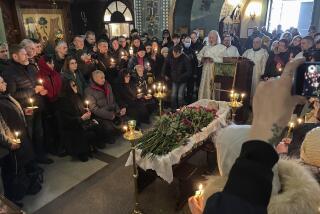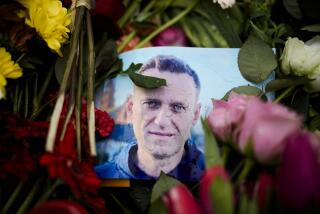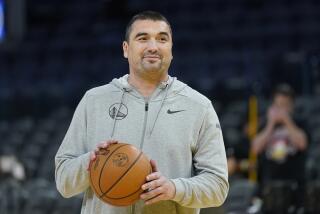Drugs Could Have Been Sneaked In to Milosevic
- Share via
THE HAGUE — Officials of the U.N. war crimes tribunal said Tuesday that former Yugoslav President Slobodan Milosevic was allowed access in detention to some visitors with only minimal surveillance and searches.
The limited scrutiny of those visits could have provided an opportunity for Milosevic to obtain the drug rifampicin, which was found in his blood and may have contributed to his death.
Because Milosevic chose to represent himself before the tribunal, he was given the right to meet with his legal advisors, diplomatic officials or prospective trial witnesses in a work space that was only lightly monitored, officials at the International Criminal Tribunal for the Former Yugoslavia said.
Visitors who came to see Milosevic in connection with his case were treated with more deference than other visitors and were searched less aggressively.
“A principle of justice is that the defense needs to be able to conduct interviews in a privileged setting,” said Alexandra Milenov, a spokeswoman for the tribunal. “Otherwise there could be a perception of unfairness or abuse.”
Milosevic was charged with genocide and war crimes for his role in the wars that tore apart the former Yugoslavia in the 1990s and led to the deaths of more than 225,000 people.
The former Serbian leader, who was taking medication for high blood pressure and heart ailments, was found dead of an apparent heart attack in his cell Saturday.
Doctors found traces of rifampicin, a powerful antibiotic, in Milosevic’s blood earlier this year and again when they autopsied his body. Rifampicin causes other drugs to break down more rapidly in the liver, rendering them less effective.
On Monday, a toxicologist who had tested Milosevic’s blood theorized that the ex-leader had taken rifampicin in an effort to make himself sicker so that he could convince officials here to let him leave the Netherlands to seek treatment in Moscow.
“I think that was his last possibility to escape The Hague,” toxicologist Donald Uges of Groningen University told reporters.
Milosevic’s son and other supporters contend that he was poisoned while in custody.
“He got killed. He didn’t die. He got killed. There’s a murder,” Marko Milosevic said Tuesday in an interview with Associated Press Television News on a flight to the Netherlands to claim his father’s body.
Officials in The Hague made no accusations against Milosevic’s visitors but left the implication that one of those visitors could have brought him a drug.
According to the Associated Press, the warden of the prison in which Milosevic was being held had previously told tribunal officials that he could not guarantee Milosevic’s health.
The warden cited the fact that drugs and alcohol had been found in Milosevic’s cell, and said it was difficult to monitor him because of his relative freedom to move around the prison to go to his office and the visitors’ area.
Milosevic was jailed in a former Dutch prison in Scheveningen, a suburb of The Hague. The detention facility is staffed by guards who work for the United Nations.
Milosevic’s privileges were governed by different sets of rules, depending on whether his visits were personal or meetings to prepare his legal defense, said Milenov, the tribunal spokeswoman.
Greater precautions were taken in the case of personal visitors, who were scanned by metal detectors and then body-searched, Milenov said. Their meetings with Milosevic were monitored by guards, who subjected Milosevic to “very comprehensive searches” before and after the personal visits, she said.
But when Milosevic met with legal advisors and others connected with his case, the court granted special conditions and privileges that loosened the scrutiny, she said. Those visitors were scanned by metal detectors but not physically searched, Milenov said.
Moreover, guards did not monitor the meetings about the case or monitor his interviews of defense witnesses, she said.
The death has been a blow to the war crimes tribunal because it fulfilled what a former U.S. diplomat in The Hague called a longtime fear: Milosevic would not live to see a verdict.
“This was the great fear, that the guy would die,” said Allen Weiner, a professor of international law at Stanford Law School who, as legal advisor to the U.S. Embassy, worked closely with the court as a U.S. government liaison.
Despite the high-stakes political pressure to keep Milosevic healthy, considerations of his legal rights placed limits on day-to-day scrutiny of his activities, particularly because he acted as his own lawyer, Weiner said.
“It’s a fundamental problem we face in any legal system,” Weiner said. “When you think a defendant, a serious criminal, is a threat to himself -- and then balancing that with his rights to due process.”
As the new information about Milosevic’s detention became public, officials in Serbia reached an apparent agreement with his family over funeral arrangements.
Late Tuesday night, Milorad Vucelic, a top Socialist Party official in Serbia, who controlled the media during the Milosevic era, announced in a televised statement that the family had decided to hold the funeral in Belgrade, the capital of Serbia and Montenegro.
Milosevic’s body will be flown home today on a commercial flight on the national airline, JAT, rather than in a special government plane.
The arrangement indicated that although the government had accommodated some of the family’s wishes, it did not want to accord him special honors.
Earlier in the day, a court in Belgrade suspended the arrest warrant for Mirjana Markovic, Milosevic’s widow, so that she could return for the funeral without facing arrest.
But because Markovic, who lives in Moscow, had failed to appear on past occasions for a hearing in the case, which involves corruption charges, the court ruled that her passport would be confiscated. The passport will be held until a hearing in the case March 23, the court ruled. Markovic was irate about the ruling, the Serbian television station B92 reported, citing sources close to her.
The Socialist Party, which Milosevic once led, has been pushing the government to accommodate a number of demands, among them granting the former president a plot in the Belgrade cemetery where other respected Serbian leaders are buried. Party leaders agreed, however, that he would not be buried in the Alley of Heroes, where Zoran Djindjic, Milosevic’s rival and the man who sent him to The Hague, was laid to rest.
Also Tuesday, a team of six Russian forensic experts arrived and met with Dutch forensic experts, said Ivo Hommes, a spokesman for the National Forensic Institute, where Milosevic’s autopsy was performed.
The Russian experts discussed the Dutch investigative procedures in the case but did not conduct a full review of the Dutch autopsy, Hommes said.
Although the Russian experts had expressed doubts in advance about the autopsy, the head of the delegation said in an interview on Russian state-run television Tuesday that the team was satisfied.
“The examination was conducted at a very high level, it was very detailed, they have 12 hours of video footage and a huge number of slides, photos, graphs and so on,” Leo Bokeria said. “We agree with the preliminary diagnosis, which is a heart attack, a sudden death from heart failure.”
*
Rotella reported from The Hague and Rubin from Vienna. Special correspondent Zoran Cirjakovic in Belgrade contributed to this report.
More to Read
Sign up for Essential California
The most important California stories and recommendations in your inbox every morning.
You may occasionally receive promotional content from the Los Angeles Times.












